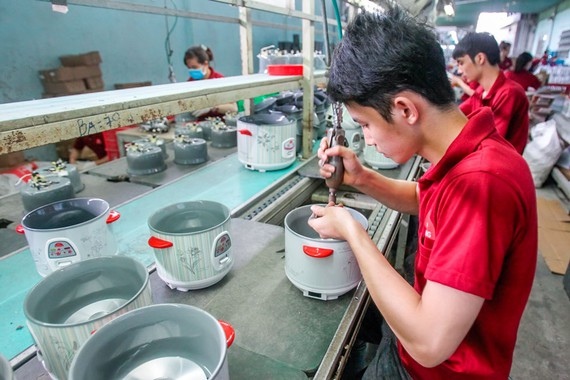Most businesses not using 4.0 technology
Most businesses not using 4.0 technology
The Covid-19 pandemic has compelled us all to accelerate the use of technology application in our workplace.
Ilustrative photo. |
However, the number of businesses using 4.0 technology or have completely digitized their work place is still relatively very small. Currently, even the digital skills of employees are quite limited or even nonexistent.
4.0 technology still far
Referring to investing in modern technology for production in the textile industry, Viet Thang Jean is one of the few names worth mentioning. This enterprise has invested more than USD 20 mn in automation lines with European standards. As a result, from having 800 manual workers, Viet Thang Jean only needs about 20 workers for these lines now.
This greatly helped in speeding up the completion of orders for the year-end shopping season for major import markets. The garment industry used to be one of the industries predicted to adopt machines to replace human power. As early as 2016, the World Labor Organization (ILO) had forecast that machines would replace up to 85% of workers in the industry. However, so far, the number of enterprises investing in automation technology is still small, as most of them are still outsourcing, with having continued low profits, so it is difficult to reinvest.
Not just in the garment industry alone, but in many manufacturing industries in Vietnam, the application of technology is still very modest. According to the Science, Technology and Innovation Report recently published by the World Bank (WB), the number of Vietnamese enterprises using 4.0 technologies, such as 3-D printing and robotics, is very small. Only 29% of enterprises use machines controlled by computers, and digital technology of industry is for 3.0, with 8.7% using this technology actively and effectively. One of the reasons pointed out is that labor costs in Vietnam are still very low and most businesses use this for their advantage.
When announcing the results of this report on 3 November, Mr. Bui The Duy, Deputy Minister of Industry and Technology, pointed out the fact that enterprises are still using 1.0 technology that was manufactured by hands, or 2.0 technology that is automatic but not connected to the computer, hence businesses seem a very long distance away from 4.0 technology. Mr. Bui The Duy feels that even though many people expect that the pandemic will be the big driving force for enterprises to move towards technological innovation, much investment is needed to create motivation for businesses to adapt to innovative technology for more sustainable development.
The World Bank report also points to a recent survey on technology adaption, showing how different types of businesses are using technology at various levels. On an average, only 20% of businesses use the complete digitalized process in general business in Vietnam, which includes marketing, billing, production planning, support sales and supply chain management. As a concrete example, while most businesses in Vietnam can conduct sales online, only 1% of businesses selling directly, use digital sales more often than other methods.
Role of workers
For enterprises to innovate and apply digital solutions in their digital transformation journey, the role of employees is very important. Fact is that workers in enterprises currently lack a lot of skills, and in particular digital skills. Two years into the Covid-19 pandemic has shown that many businesses have had to move part or all of their operations online. Employees are also gradually becoming familiar with concepts such as teamwork on online platforms, digital marketing, and selling online. However, this still does not meet the needs of employers in the current situation of the pandemic, when digital skills have become imperative to learn.
A recent survey by HR company Adecoo showed that 48% of employers expect employees to have the skills to store and backup data in cloud for the next three years. This is followed by an understanding of basic cybersecurity and database-driven decision-making skills. The main areas that are prioritized for investment by enterprises for the next three years are digital marketing at 49%, business intelligence at 48%, e-commerce at 40%, and big data at 30%. Enterprises hope that investing in these areas can meet customer needs, reduce costs in the long term, and maintain competitiveness in the market.
Most businesses today, after recruiting new graduates, have to re-train them from the beginning. Thus, the role of enterprises in improving digital skills for employees is very important. Adecoo's survey shows that 29% of medium enterprises and 31% of small businesses are quite aware of the capacity and capability of each employee. In addition, the percentage of leaders in SMEs committed to promoting digital skills is also quite high. Enterprises are ready, however, employees, especially young workers, are not yet ready to improve their labor skills, including digital skills.
Mr. Tran Anh Tuan, Vice President of Ho Chi Minh City Vocational Education Association, said that the current labor market offers many jobs, but only stable jobs have good stable income. However, new school graduates are limited, and most of the youth after graduation who have insufficient qualifications, enter the SME, or micro companies at a low salary. When going to work, employees still have to face the pressure of discipline, which makes them stressed and depressed, so they switch to another job. Some college and university graduates even decide to drive motorbike taxis. This fact shows that ability to tackle pressure is one of the weaknesses of many of our workers. This will be a challenge for businesses and for employees themselves in the journey towards innovation and improving digital skills.























